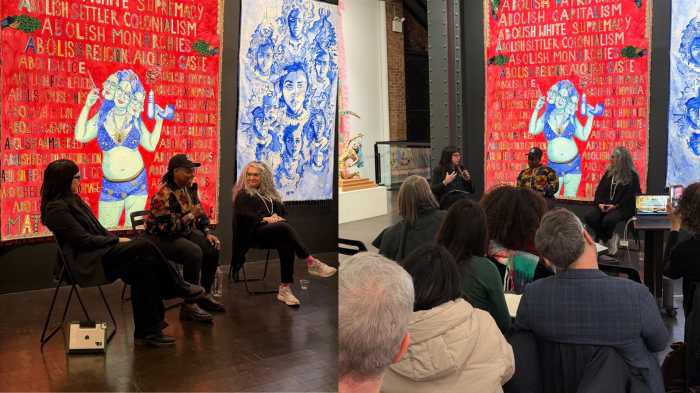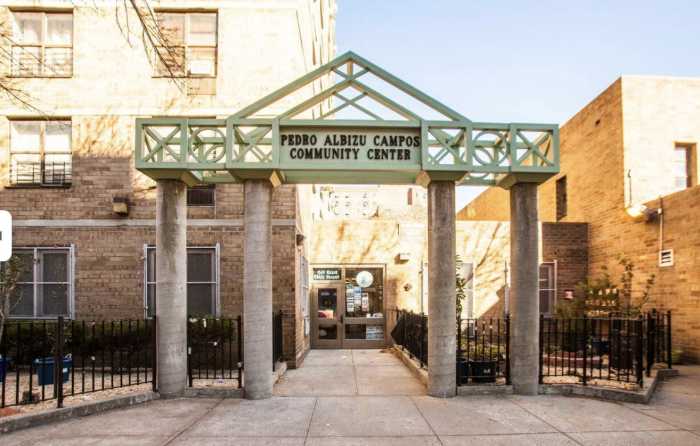By Lincoln Anderson
Legendary impresario Art D’Lugoff was remembered with warm tributes, music and comedy performances and pledges to fulfill his dream — to create a Greenwich Village Folk Music Museum — at a memorial on Sun., Nov. 22.
Fittingly, the venue was Le Poisson Rouge on Bleecker St., the former site of D’Lugoff’s renowned Village Gate.
Among the assembled stars were comedians Dick Gregory and husband-and-wife team Jerry Stiller and Anne Meara, musicians David Amram and Peter Yarrow and the multi-talented Geoffrey Holder.
Also giving tributes were D’Lugoff’s children, his son, Raphael (“Raffi”), and three daughters, Racheal, Dahlia and Sharon.
D’Lugoff died Nov. 4 at age 85. He opened the Village Gate in 1958 and, after a long, star-studded run, closed it in 1994.
After living for years on the Upper West Side, D’Lugoff moved to Riverdale four years ago.
Holder came out slowly and, standing with some effort, demanded that the house lights be turned up, and that the crowd give D’Lugoff a standing ovation. It was D’Lugoff’s opening night, with a packed house, up in “Heaven’s Gate,” Holder explained — then pointed up.
Musical virtuoso David Amram thanked D’Lugoff for letting him be himself.
Amram quipped how D’Lugoff always stressed to performers to “be on time and end on time.” As a trio of young Italian jazz musicians played “All of Me,” Amram joined in, energetically chirping through two small flutes at the same time, one out of each corner of his mouth.
Noting he’ll soon turn 80, Amram poignantly recalled how D’Lugoff gave him the chance to perform on the Gate’s stage.
“Art always told me to not let anyone tell you who you are — that we all have a creative gift,” he said, getting misty eyed.
After breaking the ice with some self-referential “You know you’re old when…” jokes, Gregory spoke about how much D’Lugoff’s support had meant to him. He noted he always got top billing, no matter who else was performing. Sometimes, he’d be on the bill with such stellar musical talents as Miles Davis and B.B. King.
“He wanted to give you more than your money’s worth,” Gregory said.
He recalled D’Lugoff as a man of integrity.
“The mob controlled everything,” Gregory said of New York nightlife in the 1950s and ’60s. “This was one of the few clubs that wasn’t under mob influence.”
Gregory said while blacks were accepted as dancers and singers, it was hard for them to break into stand-up comedy. But D’Lugoff, by giving Gregory a forum, helped pave the way for Bill Cosby and Richard Pryor, he said.
Yarrow said he owed D’Lugoff thanks for a bit of prescient advice.
“He told me I wasn’t ready as a solo. If he hadn’t, we would not have made it as a group,” he said of Peter, Paul and Mary.
“I don’t think anyone ever produced performers who were able to so much be themselves and be loved,” Yarrow reflected of D’Lugoff.
He then gently sang “Puff, the Magic Dragon,” strumming along on guitar, as the crowd, without any urging, took up the classic refrain.
Stiller and Meara also got their start at the Village Gate, though they admitted they bombed, before finding success at other local clubs.
“I’m glad to be here — I’m glad to be anywhere,” Stiller joked. “I hate memorials — because I don’t really feel too well, to tell you the truth.”
City Councilmember Alan Gerson vowed to work to make the Greenwich Village Folk Music Museum a reality, though his term in office ends after this month.
Dick Gregory said he hoped a Native American would someday be president.
“As a kid who grew up in Greenwich Village, Art was larger than life,” Gerson said. “And to be able to work on this museum with Art was a dream for me. … I pledge that, in memory of Art D’Lugoff, and because it’s the right thing to do — and it took us a little while longer, because he was a stickler and wanted to get it done perfectly — we will get it done, and get it done perfectly.”
Paul Colby, founder of The Bitter End, also on Bleecker St., perched on a stool to steady himself as he spoke of his friendly rivalry with D’Lugoff decades ago. He noted The Bitter End is being inducted into the Rock and Roll Hall of Fame.
“Art had his list, I had my list,” Colby said. “My list — Carly Simon, James Taylor, Neil Young.”
Wearing a red turtleneck, Oscar Brand, 89, whose folk-music show has aired on WNYC for 60 years, sang a selection of folk songs a cappella. Then Brand — who was blacklisted as a communist in 1950 — declared of D’Lugoff’s political beliefs, “I believe that Art D’Lugoff was one of the good ones.”
Like Colby and Brand, Elizabeth Butson, The Villager’s former publisher, is a member of the board working to create the Folk Music Museum.
“I stood in line in ’68 to see Jacques Brel, and then I stood in line again to see Odetta,” Butson said. “The Village Gate was not just a club in the Village, it was the club in the Village.”
Butson said the Greenwich Village-Chelsea Chamber of Commerce had planned to honor D’Lugoff with its second Greenwich Village Music Legends Award. Odetta got the first one last year. Instead, they will present the award in his honor to his family members, she said.
“The Folk Music Museum must be in Greenwich Village,” Butson stressed. “Nowhere else will do.”
D’Lugoff’s son Raffi shared some of his father’s colorful sayings. If dinner at a restaurant was only so-so, D’Lugoff would dub it “mamafuku.” When someone in business had done him wrong, he’d say, “He should fall on his head.” He would say of himself if he had reneged on a promise: “I’m a pisher.
“He took a big bite of life,” Raffi said, “and he wanted to share it.”
His daughter Dahlia said her dad called the club “the candy store.”
David Handler, one of the co-owners of the new Le Poisson Rouge, which offers eclectic live music, said D’Lugoff gave them tips, such as “no surf and turf,” and even helped them get their tables and chairs at a place in New Jersey. Handler said they’ve been trying to restore a sense of culture to the Village that had been missing of late, and hope D’Lugoff would be proud.
Closing out the memorial, drummer Bobby Sanabria performed with a combo including, as he put it, “octoconganarian” Candido Camero, 88. Camero was one of the headliners at the Gate’s opening night in 1958. Playing D’Lugoff favorites — like “Night in Tunisia” and “Darn That Dream” — a smiling Camero showed he’s still got it, hammering the congas with lightning-fast hands, his fingertips covered with white tape.






































